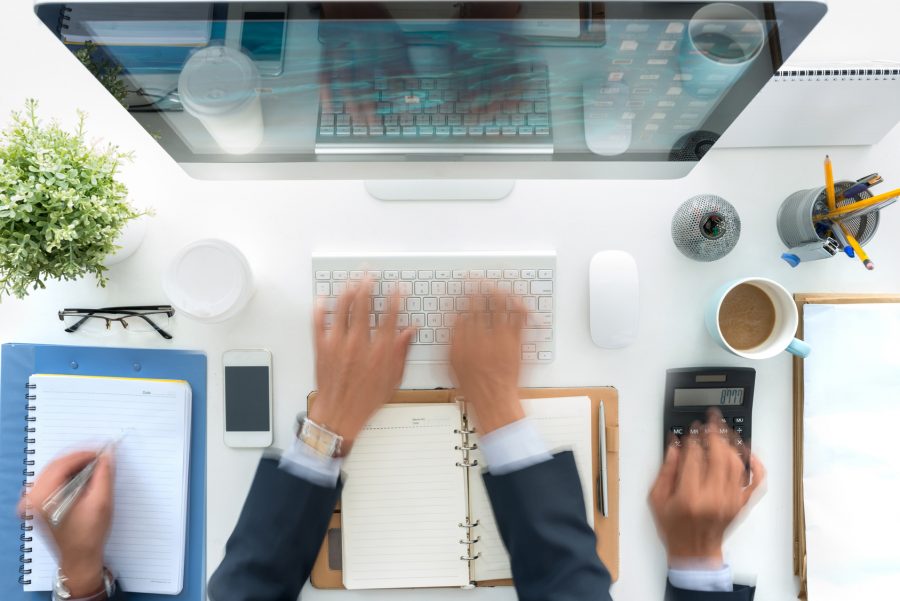
Multitasking At The Office Actually Makes You LESS Productive
Many people think that multitasking at the office makes you twice as productive. But I’m here to tell you it does not.
Here is a typical workday. As you are listening to music, you send an email, text with your friends and prepare a presentation for a meeting all the while watching the clock. It’s multitasking at its finest. Sound familiar? I bet you think you’re the master multitasker.
But science says you’re not.
In fact, multitasking at the office actually makes you LESS productive. The more you multitask, the less you are able to concentrate. Even the term multitasking is actually a misnomer. People can’t actually do more than one task at a time. Instead our brain switches tasks.
Here are five reasons why you’re actually not as good at multitasking as you think you are:
1. Multitasking Makes It Harder To Figure Out What’s Relevant
The more you multitask, the less your brain is able to filter out information. Researchers found those who multitask have difficulty filtering irrelevant information, plus use more energy using parts of the brain that aren’t necessary for the task at hand.
So, when you focus on one thing at a time, the brain is able to zone in and filter out the rest, leaving more of your brain’s resources available to what you are actually doing.
2. Multitasking Makes You Less Effective
Even if you’re getting things done while multitasking, chances are you aren’t getting them done as well as you could be. We do best when we concentrate on one task at a time. It’s also insulting to the work (and the person who assigned it), because it indicates that task doesn’t deserve our complete attention.
3. Multitasking Makes You Take Longer To Finish Your Task
Switching from one thing to another makes you take longer to complete tasks. Changing focus can distract you from each individual topic and completing them. Your mind has to change gears with each task. Constant jumping from one thing to another won’t save you time or make you concentrate harder on each task. Doing them one by one is better AND faster.
4. Multitasking Lowers Your Quality Of Work
The biggest problem with multitasking is that it can lower the quality of our work. When we try to do two or more things at once the result is that we do everything worse than if we focused on each task in turn.
When we switch tasks, our minds must reorient to cope with the new information. With multitasking, we can’t devote our full concentration and focus to every switch. So the quality of our work suffers and we make more mistakes. The more complex or technical the tasks we’re switching between, the bigger the drop in quality is likely to be. For instance, it would be impossible to write a quality presentation while paying attention to an online training course.
5. Multitasking Causes More Stress
According to many studies, chronic multitaskers have increased levels of the stress hormone cortisol. Normal levels of cortisol can be helpful for the body, but when levels are too high it can cause all kinds of health problems (and make you fat, too). The constant toggling from one task to another creates a cognitive overload. According to a study at the University of Sussex, constant multitasking actually damages your brain. They found out that people who multitask have lower brain density in the region of their brain responsible for empathy, cognitive control and emotional control.
6. Multitasking Causes You To Miss Out On Life
Just because your eyes are open doesn’t mean you are seeing everything in the world around you. Perception depends upon numerous factors, including attention. Sometimes we miss the things that are right in front of us. For instance, you are out to lunch with a friend but become distracted by reading an email that came through to your phone. Your brain does not have an ability to concentrate on the conversation while reading the work email. Concentrate on what’s right in front of you and enjoy time away from work.
The pressure to get all our work done in the shortest amount of time is why multitasking has gotten so out of hand. The key to productivity is actually to be come proficient in “single tasked” working. Make a list of the things you need to do. Start by working on your most important task first. Once you start to work through your “to-do” list the less anxiety you will feel and you’ll be able to resist the productivity drain caused by multitasking.

John Ofield is a recognized expert in the office furniture and office cubicle industry in Houston, TX, with over 40 years of experience. As the founder of ROSI Office Systems, he specializes in furniture space planning, custom cubicle designs, modern office chairs and tables, and high-quality commercial furniture. John’s expertise helps businesses enhance productivity and collaboration. He is also dedicated to mentoring entrepreneurs and redefining workspaces to inspire success.